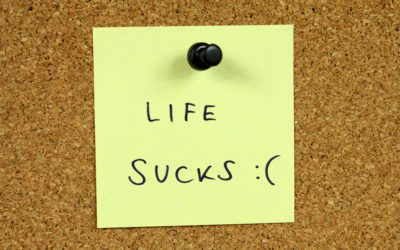The foundation of that dive is exploring what’s true for all human beings, regardless of their upbringing or circumstances. When we can really see what we have going for us (and what we’re up against) in the realm of creating results, high performance, and a life well-lived, we can point others to that same potential (and those same obstacles) in themselves.
At the simplest level, there are three fundamental principles or “forces” in play behind any and every experience a human being can have…
1. There is a oneness to life – an energy that runs through everything like an animating spirit, invisibly bringing things to life like the electricity that stands ready to power any device we might choose to plug into it. It is pure potential, indiscriminately empowering whatever thoughts we drop into it like the lamp of a projector indiscriminately projecting the shadow of whatever passes in front of it onto a screen.
In my work, I tend to describe this invisible ever-present energy as Mind (with a capital “M”), and the intersection of that universal force with our individual biology as “the deeper mind”. While it sometimes seems as though it exists outside of us, we can no more be truly separate from it than an individual wave from the ocean
2. There is a capacity in every human being to be more or less awake to our experience, and to experience it at different levels. In the abstract, this capacity can be described as Consciousness (with a capital “C”). It is like a mirror, reflecting whatever passes in front of it without being affected by it. It is the sky through which birds fly and inside of which clouds come and go.
While Consciousness itself is universal and includes the potential for any and all experience, our personal level of “awakeness” to that potential expands and contracts based on our moment by moment level of understanding of how things work.
3. Thought (with a capital “T” is pure creative potential, bringing form out of the formless like, in the words of Syd Banks, “a magical paintbrush”. Thought is the pure spiritual energy through which both our habitual thinking and inspired ideas come to mind. It is the playdough of the universe, and we use it to create monsters and demons and heavens and angels with equal frequency.
When we unwittingly create more demons than angels without noticing that they flow forth from the same pen, we struggle; when we deliberately orient our thoughts towards the positive, we enjoy our lives more; when we see beyond both positive and negative to the space of pure Consciousness which contains them, the energy of Thought which creates them, and the animating force of Mind which brings them to life, we thrive.
While I hope you get a sense of these universal energies as I describe them, I know that even reading the best description of how life works will no more change your life for the better than reading a beautifully written menu will satisfy your hunger. So in pointing out these invisible forces, we often point first to their effects – like explaining electricity by switching on a lamp or demonstrating gravity by dropping a pen to the floor.
And the easiest place for many of us to see Mind, Thought, and Consciousness in action is in seeing how our experience of a particular life event can change over time and even moment by moment:
- Our bank balance is what it is, yet according to our thoughts it can seem like a lot or a little; a dwindling or expanding pile; nowhere near or far more than enough. We feel our thinking, so each of those thoughts bring with them temporary feelings of security or insecurity, happiness or sadness, excitement or fear.
- Our thinking is what it is, but depending on our level of consciousness in the moment, we get lost in the feelings it brings or see them for what they are – an everchanging movement of energy against the constant backdrop of our deeper nature. Depending on our level of understanding, the thought/feeling system can drag us around by the nose or prove a fascinating movement within the stillness of our nature.
- Our level of consciousness is what it is, but the constant energy of Mind is always on, keeping our hearts beating, lungs breathing, and brains thinking as we go about our lives.
Nikki Welch, a graduate of Supercoach Academy in 2016, found there were three phrases that summed up and helped remind her of the potential impact of this understanding on the way we coach our clients and the way we live our lives. I’ll share her three phrases along with my commentary and then add a fourth phrase that I hear myself saying almost more than any other in my own coaching and teaching…
“Oh well…”
My friend and colleague Cathy Casey is a kind of “inmate whisperer” who has used her understanding of the Three Principles to help countless people in the prison system reconnect with their innate wisdom and well-being and where possible, reintegrate with society after their incarceration with a remarkably low rate of recidivism.
She has told me on many occasions of the startling realization that many of the prisoners who went through her programs had when they first began to see that experience comes via Thought, not from other people or circumstances in the world.
“Had I known then what I knew now,” the prisoners would say with regret and sometimes horror, “I wouldn’t have done what I did.”
“Oh well,” Cathy would say, eyebrows arched in both acceptance and recognition of the fact that recognizing innocence and accepting consequences are not mutually exclusive.
For myself, I first really got this when I was beating myself up for all the suffering I put myself through as I did my best to cope with years of depression and suicidal ideation that I never dreamt were the result of a simple misunderstanding of where my feelings and experience actually came from.
The principles-based psychiatrist William Pettit asked me to consider that no matter how long someone has been stumbling around in the dark, when the lights come on, they have two choices. They can beat themselves up for the damage they did when it was dark, or they can be grateful for the light. Since that day, with each new insight I have into how things really work and how much more gracefully I handle life when I see the invisible energies behind it, I have done my best to say “oh well”, make amends where I can, and gratefully move forward with a higher level of understanding and compassion than before.
Which brings us to phrase two…
“Me too!”
There is a myth that seems common to pretty much everybody who learns about the nature of Mind, Consciousness, and Thought that when they really understand how things work, they’ll never be unhappy, make mistakes, or struggle ever again. Which is a bit like expecting studying gravity to make you immune to its effects. Unlike Wile E. Coyote in every Roadrunner cartoon ever, gravity pulls us toward the ground long before we think to look down and see how far we have to fall.
These principles are fully explanatory and highly predictive because they’re in play whether we know about them, like them, or believe in them. Which means that all of us who study them tend to have a lot of compassion for the suffering of others. Like them, we get caught up in our thoughts from time to time. And like them, when we do, we’re prone to stress, pressure, insecurity, and all the other feelings that come with the illusion that our feelings are coming at us from the outside world instead of from the invisible energy of Thought taking form inside us in the moment.
So while hopefully we don’t take our suffering to heart in the same way, knowing that Thought is a transient energy that ebbs and flows on its own without needing or benefitting from our intervention, we still fall for the illusion and feel it just the same.
In fact, every time I’m starting to feel proud of how much my understanding of these principles is helping me cope with truly difficult circumstances, I get caught out. Because at some point it becomes apparent to me that it’s not my depth of understanding that’s helping me cope; it’s my lack of understanding that’s making it look like there’s something outside me creating feelings I need to cope with.
Fortunately, we have phrase three:
“Next!”
Mara Gleason, the co-founder of One Solution and one of my daughter’s favorite human beings on the planet, was sharing a story at last year’s Academy about the first time she had to present the principles to what she perceived to be a “hostile” audience. Each time she started to go down a rabbit hole of self-doubt, she recognized that those thoughts weren’t going to take her anywhere useful and heard a voice inside her own head call out “Next!” and call forth something fresh, like going back to the drawing board and starting a new page instead of desperately trying to fix the old one.
We are innately resilient because there are an infinite number of blank pages in the universe, and this capacity for fresh thought is one of the most hopeful implications of the principles. We are naturally creative because we’re not stuck with our habitual thinking, no matter how many years we’ve been thinking it. We don’t even have to find a better way – we can just let go of what we know doesn’t work and make space for something better to come along. And because of the infinite creative potential of the deeper mind, something better inevitably will.
Which brings us to phrase four:
“No, really…”
I think of this as the advanced course in this understanding – seeing that it’s actually true in every situation for every human being, even when it looks like we’ve found an exception. There was a lovely moment on last week’s Academy when one of the participants was sharing his anxiousness about going out into the world and actually speaking to people about what was possible for them without having any tools or techniques to hold on to. When the person coaching him gently asked him where he thought that experience of anxiousness was coming from, he seemed confused. Then his eyes lit up.
“Do you mean that this isn’t just a positive philosophy? I’m ACTUALLY feeling Thought in the moment, not the stress of a future challenge?”
In that one moment of insight, his level of consciousness shifted and his experience of his experience of anxiousness changed. Instead of looking like a natural result of trying something new, it now looked like what it was – the feeling of thinking anxiously about an imaginary future. Since thinking anxiously about an imaginary future didn’t seem like a good idea to him, he was willing to let that thinking pass through, and as inevitably happens, new thoughts came along which inspired him and took his experience in a different and more helpful direction.
So if you’re wondering whether or not this will “work” for you, all I can tell you is to look for yourself and see what you can see. And if you get stuck, don’t really get it, or are beating yourself up for all the things you would have done differently had you understood this better earlier, well…
Oh well.
Me too.
Next!
(No, really… :-)
With all my love,
![]()





